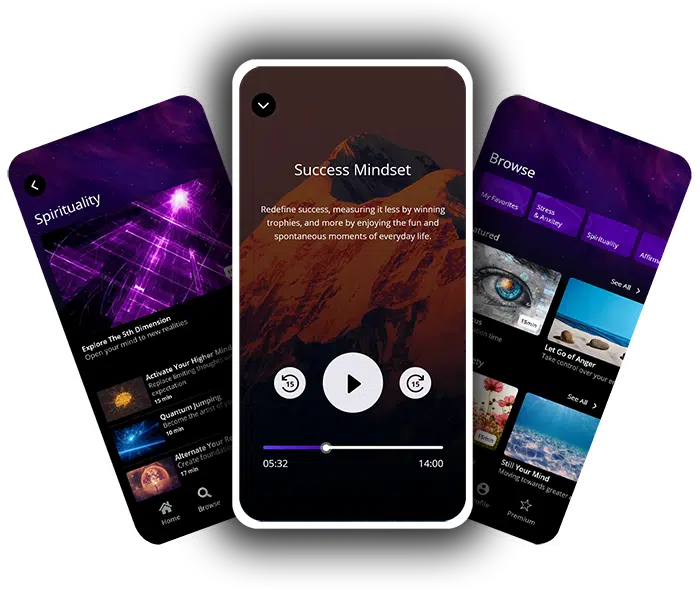Tossing and turning all night can make you feel exhausted during the day. Insomnia affects many people, leading to a significant decline in daily functioning. This article will share eight effective strategies and additional tips to help you combat insomnia and enhance your sleep quality.
Get ready for better nights ahead!

Unleash Your True Potential!
Explore the world of meditation with our powerful guided sessions crafted to bring peace and strength to your spirit.
But first, let’s ensure our sessions are the perfect fit for you.
Take our short quiz to find out!
8 Techniques to Combat Insomnia
Combat insomnia with controlled breathing, body scan meditation, progressive muscle relaxation, imagery, the military method, cognitive behavioral therapy for insomnia (CBT-I), herbal tea, and over-the-counter medications.
These techniques offer diverse approaches to help you overcome insomnia and improve your sleep quality.
Controlled Breathing
Controlled breathing can be a very powerful tool to fight insomnia. It helps calm the mind and prepares your body for sleep. Start by finding comfortable position in bed. Gently close your eyes, then slowly inhale through your nose, counting to four.
Hold that breath for seven seconds before exhaling slowly through the mouth for eight seconds. This method reduces stress and anxiety, making it easier to fall asleep.
Practicing this technique every night can improve sleep patterns and relieve sleep disturbances caused by stress or restlessness. Controlled breathing not only assists in faster sleep onset but also enhances quality of sleep throughout the night.
As you get better at this exercise, you’ll find falling asleep becomes more effortless over time, contributing significantly to overcoming insomnia and improving overall sleep hygiene.
Body Scan Meditation
Focus your mind on different parts of your body, starting from toes and moving up. Pay attention to any tension or discomfort you may feel in each area. Take slow deep breaths and consciously release any tension as you exhale.
Body scan meditation can help alleviate physical and mental stress, promoting relaxation for better sleep.
Engage in body scan meditation regularly before bedtime to calm both body and mind. This practice encourages mindfulness by bringing awareness to bodily sensations, easing muscle tension and soothing the mind.
Progressive Muscle Relaxation

Unleash Your True Potential!
Explore the world of meditation with our powerful guided sessions crafted to bring peace and strength to your spirit.
But first, let’s ensure our sessions are the perfect fit for you.
Take our short quiz to find out!
Progressive Muscle Relaxation is a stress-reducing technique that involves tensing and relaxing each muscle group in body. It helps to release physical tension, which can promote relaxation and improve sleep.
This method is effective for combating insomnia as it brings awareness to the difference between tension and relaxation in the body, aiding in achieving a state of calmness conducive to falling asleep.
Engaging in Progressive Muscle Relaxation before bedtime can help relieve stress and induce a sense of tranquility, contributing to better sleep quality.
Imagery
Visualizing peaceful and calming scenes like a serene beach or a tranquil forest can help relax your mind before bed. This technique, known as imagery, can reduce stress and anxiety, creating more conducive environment for sleep.
Research has shown that incorporating positive mental images into your night routine can significantly improve sleep quality and duration. By focusing on soothing and pleasant mental pictures, you can ease your mind into a state of tranquility, making it easier to drift off to sleep naturally.
Engaging in guided imagery exercises before bedtime is a simple yet effective way to combat insomnia. Visualization techniques not only promote relaxation but also contribute to overall stress management and improved sleep patterns by calming the mind and reducing hyperarousal.
The Military Method
Use the “4-7-8” breathing technique for relaxing and promote sleep. Inhale for 4 seconds, hold your breath for 7 second, and exhale slowly for 8 seconds. This method helps calm your nervous system and prepares your body for sleep.
Focus on relaxing each part of your body from head to toe by tensing and then releasing specific muscle groups. By progressively relaxing your muscles, you can alleviate physical tension and prepare yourself for a restful night’s sleep.
Cognitive Behavioral Therapy for Insomnia (CBT-I)
Insomnia treatment involves cognitive behavioral therapy (CBT-I), a proven method for chronic insomnia that focuses on changing negative thoughts and beliefs about sleep. This therapy also addresses behaviors that may worsen sleep problems, helping individuals develop better sleeping habits.
CBT-I emphasizes relaxation techniques, stimulus control, and setting a consistent sleep schedule to enhance overall sleep quality.
Furthermore, CBT-I helps individuals identify and replace thoughts or actions that contribute to poor sleep patterns. It equips them with skill to manage stress and anxiety related to sleeping difficulties.
Use of Herbal Tea
Herbal tea, like chamomile or valerian root, can aid in relaxation and promote better sleep. These teas contain natural compounds that have been shown to have calming effects on the body, helping to reduce stress and anxiety – key factors in combating insomnia.
The soothing warmth of herbal tea can also help signal to your body that it’s time to wind down for the night, creating a relaxing bedtime ritual that can contribute to improved sleep quality.
So, incorporating a warm cup of herbal tea into your evening routine may provide a gentle nudge towards a more restful slumber without the need for medication or other interventions.
Use of OTC Medications
OTC medications can provide relief for occasional insomnia. These medications are available without a prescription and include antihistamines, melatonin supplements, and low-dose doxylamine.
Melatonin supplements can help regulate sleep-wake cycles, while antihistamines may cause drowsiness to aid in falling asleep. However, it’s essential to use OTC medications as directed and consult a healthcare professional if you have any underlying medical conditions or are taking other medications to avoid potential interactions.
Taking OTC medications should be done cautiously due to risk of dependency and potential side effects such as dizziness, drowsiness, and impaired coordination. Always follow dosage instructions carefully, avoid prolonged use without consulting a healthcare provider, and consider non-pharmacological approaches alongside OTC options for managing insomnia.
Tips for Maintaining Good Sleep Habits
Stick to regular sleep schedule for better rest. Create a peaceful sleep environment for quality sleep.
Set sleep schedule and stick to it
Maintaining consistent sleep schedule helps regulate your body’s internal clock, promoting better sleep quality. Waking up and going to bed at the same time every day, even on weekends, can help establish a healthy sleep pattern.
This routine reinforces your body’s natural circadian rhythm, making it way easier to fall asleep and wake up refreshed. Consistency is key in training your body for restful nights and productive days.
Establishing a regular bedtime also aids in reducing the time it takes to fall asleep and minimizes nighttime awakenings. By sticking to this schedule, you create a sense of predictability that cues your brain when it’s time to wind down and prepare for sleep.
Avoid caffeine, alcohol, and stimulants in the evening
Limit consumption of caffeine, alcohol, and stimulants at night. Disrupting your sleep cycle, they can make it harder to fall asleep. Set a specific time to stop consuming these substances each evening.
Keep in mind that caffeine can stay in your system for hours after consumption, so be mindful of how much you consume throughout the day.
Drinking chamomile tea or warm milk is a popular remedy for winding down before bed. Incorporate relaxation techniques like reading or taking a warm bath into your evening routine.
Create a comfortable sleep environment
Arrange the room temperature to be cool, around 60 to 67 degrees. Make sure your mattress and pillows are supportive and also comfortable. Eliminate noise and light distractions using earplugs or blackout curtains if necessary.
Keep electronics out of reach before bedtime for a restful environment. Use calming gragrances like lavender or chamomile in the bedroom, promoting relaxation conducive to sleep. Position your bed away from windows to avoid outside disturbances.
Prioritize creating an optimal sleep space as it can greatly impact your ability to fall asleep and relax in overcoming insomnia.
Engage in relaxing activities before bed
Participate in calming activities like reading, taking a warm bath, or sipping herbal tea to unwind before bedtime. Relaxing and winding down can help improve sleep quality by easing stress and tension from the day.
Avoid screen time as blue light can disrupt your body’s natural sleep cycle. Which makes it harder to fall asleep.
Practice meditation or breathing exercises to promote relaxation and prepare your mind for rest. Engaging in these soothing activities before bed can aid in reducing anxiety and allow for better sleep patterns.
Seek professional help if needed
If struggling with severe or chronic insomnia, it’s crucial to seek medical assistance for proper diagnosis and treatment. Factors such as stress, medication, and sleep habits can contribute to insomnia; therefore, consulting a healthcare professional is vital to address the underlying causes.
Seeking help from a sleep specialist may lead to personalized treatment options such as cognitive behavioral therapy for insomnia (CBT-I) or prescription medications if necessary. Remember that addressing persistent sleep difficulties with professional guidance can significantly improve your overall well-being and daytime functioning.
In cases of ongoing struggles with sleep deprivation despite trying various remedies, reaching out for medical support is essential. Chronic lack of quality sleep negatively impacts daily performance and functioning; thus seeking professional help ensures you receive appropriate care specific to your specific needs.
Conclusion
Combatting insomnia involves practicing controlled breathing, body scan meditation, progressive muscle relaxation, imagery, the military method, and CBT-I. Setting sleep schedule and sticking to it is crucial.
Avoiding caffeine and alcohol at night and seeking professional help when needed are important steps for better sleep. Creating peaceful and comfortable sleep environment and engaging in relaxing activities before bed can also aid in improving your sleep quality.










